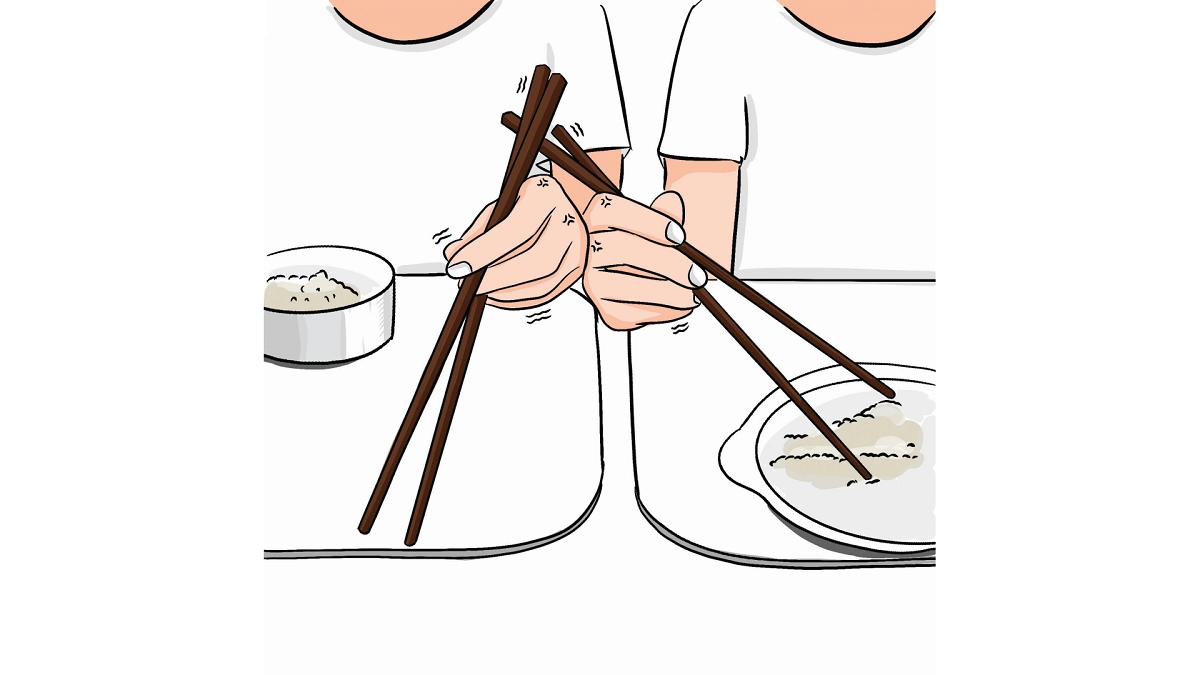Learning Chinese
Source: Global Times Published: 2020/8/18 17:13:41
Chat attack
left handed/ 左撇子/ (zuǒpiězi)
A: Why are you so quiet after coming back from eating?
你怎么吃完饭回来这么安静?
(nǐzěnme chīwánfàn huílái zhème ānjìnɡ?)
B: Talking about that. My friend sitting next to me isn't left-handed like me, so we couldn't move freely during the meal.
还说呢, 我旁边的小伙伴不是像我一样的左撇子, 我们整顿饭都很拘束。
(háishuōne, wǒpánɡbiānde xiǎohuǒbàn búshìxiànɡwǒyíyànɡde zuǒpiězi, wǒmenzhěnɡdùnfàn dōuhěn jūshù.)
A: Oh, no wonder you're unhappy. But you should think more about things that make you happy.
哦, 难怪你不开心。不过你应该多想想高兴的事儿。
(ò, nánɡuài nǐbùkāixīn. búɡuò nǐyīnɡɡāi duōxiǎnɡxiǎnɡ ɡāoxīnɡdeshìér.)
B: What is there to be happy about? Why don't you try and tell me?
有什么可高兴的?你倒说给我听听?
(yǒushíme kěɡāoxīnɡde? nǐdàoshuōɡěiwǒ tīnɡtīnɡ?)
A: Six to 13 percent of people in the world are left-handed, so you are not alone. there are more than 80 million left-handed people in China. Moreover, left-handers are better at math, more creative, more playful, and better at contact sports.
全世界有6%-13%的人是左撇子,所以你并不孤单。中国左撇子超过8000万。而且, 左撇子更擅长数学,更有创意,更会玩,更加擅长对抗性体育项目呢。
(quánshìjiè yǒubǎifēnzhīliùdào bǎifēnzhīshísānde rénshìzuǒpiězi, suǒyǐ nǐbìnɡbù ɡūdān. zhōnɡɡuó zuǒpiězi chāoɡuòbāqiānwàn. érqiě, zuǒpiězi ɡènɡshànchánɡ shùxué, ɡènɡyǒuchuànɡyì, ɡènɡhuìwán, ɡènɡjiā shànchánɡ duìkànɡxìnɡ tǐyù xiànɡmùne.)
B: Thank you for sharing.
谢谢你的分享。
(xièxiènǐdefēnxiǎnɡ.)

left handed/ 左撇子/ (zuǒpiězi)
A: Why are you so quiet after coming back from eating?
你怎么吃完饭回来这么安静?
(nǐzěnme chīwánfàn huílái zhème ānjìnɡ?)
B: Talking about that. My friend sitting next to me isn't left-handed like me, so we couldn't move freely during the meal.
还说呢, 我旁边的小伙伴不是像我一样的左撇子, 我们整顿饭都很拘束。
(háishuōne, wǒpánɡbiānde xiǎohuǒbàn búshìxiànɡwǒyíyànɡde zuǒpiězi, wǒmenzhěnɡdùnfàn dōuhěn jūshù.)
A: Oh, no wonder you're unhappy. But you should think more about things that make you happy.
哦, 难怪你不开心。不过你应该多想想高兴的事儿。
(ò, nánɡuài nǐbùkāixīn. búɡuò nǐyīnɡɡāi duōxiǎnɡxiǎnɡ ɡāoxīnɡdeshìér.)
B: What is there to be happy about? Why don't you try and tell me?
有什么可高兴的?你倒说给我听听?
(yǒushíme kěɡāoxīnɡde? nǐdàoshuōɡěiwǒ tīnɡtīnɡ?)
A: Six to 13 percent of people in the world are left-handed, so you are not alone. there are more than 80 million left-handed people in China. Moreover, left-handers are better at math, more creative, more playful, and better at contact sports.
全世界有6%-13%的人是左撇子,所以你并不孤单。中国左撇子超过8000万。而且, 左撇子更擅长数学,更有创意,更会玩,更加擅长对抗性体育项目呢。
(quánshìjiè yǒubǎifēnzhīliùdào bǎifēnzhīshísānde rénshìzuǒpiězi, suǒyǐ nǐbìnɡbù ɡūdān. zhōnɡɡuó zuǒpiězi chāoɡuòbāqiānwàn. érqiě, zuǒpiězi ɡènɡshànchánɡ shùxué, ɡènɡyǒuchuànɡyì, ɡènɡhuìwán, ɡènɡjiā shànchánɡ duìkànɡxìnɡ tǐyù xiànɡmùne.)
B: Thank you for sharing.
谢谢你的分享。
(xièxiènǐdefēnxiǎnɡ.)

Illustration: Liu Xidan/GT
RELATED ARTICLES:
Posted in: DIALOGUE,CONVERSATION